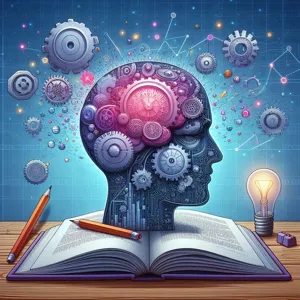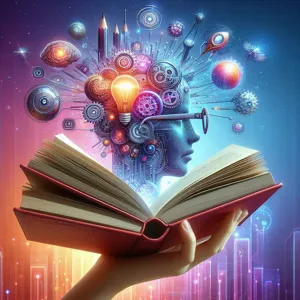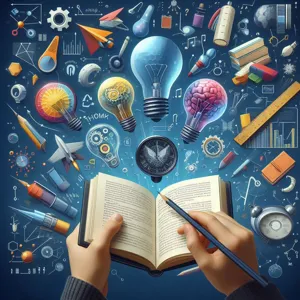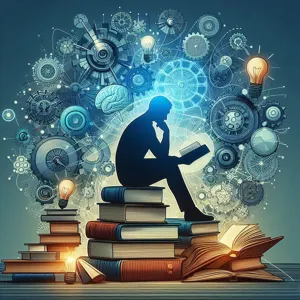In a world brimming with information and stories waiting to be told, the right book has the power to transform not just our thoughts, but also our very perception of life.
The journey of discovering literature that challenges your thinking and expands your horizons can be both exhilarating and daunting. With countless genres and titles vying for your attention, how do you navigate this literary landscape to find the gems that will push you out of your comfort zone? In this blog post, we will explore effective strategies for uncovering thought-provoking reads that spark curiosity, inspire introspection, and encourage you to view the world through a different lens. Whether you’re seeking to engage with diverse cultures, tackle complex ideas, or simply break free from your usual reading patterns, join us as we unlock the secrets to finding books that not only entertain but also ignite a deeper understanding of ourselves and the world around us.
1. Introduction: The Importance of Diverse Reading
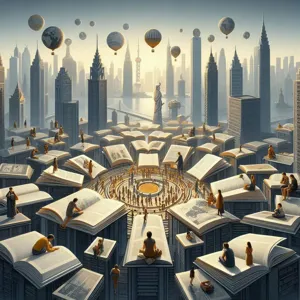
In an age dominated by information overload and the rapid dissemination of ideas, the importance of diverse reading has never been more pronounced. Just as a well-rounded diet is crucial for physical health, a varied reading list is essential for mental and intellectual growth. Engaging with a multitude of perspectives not only enriches our understanding of the world but also fosters empathy, critical thinking, and creativity.
When we limit ourselves to familiar genres or authors, we inadvertently confine our worldview, missing out on the transformative power of literature that challenges our preconceived notions. Diverse reading exposes us to different cultures, philosophies, and experiences, prompting us to question our beliefs and assumptions. Whether it’s delving into fiction that portrays lives vastly different from our own or exploring non-fiction that tackles pressing social issues, every page turned can offer a new lens through which to view the world.
Moreover, in a society that thrives on dialogue and debate, being well-read in diverse topics equips us with the knowledge to engage meaningfully in conversations. It broadens our horizons, enabling us to connect with others in ways we might never have considered. As we embark on this journey of discovery, we open ourselves up to the richness of human experience, allowing literature to guide us toward greater empathy and understanding.
So, how can we unlock new perspectives and discover books that challenge our thinking? Let’s explore some effective strategies that will not only enhance our reading habits but also broaden our horizons in ways we never thought possible.
2. Understanding Your Current Reading Habits
Before embarking on a journey to discover books that challenge your thinking and broaden your horizons, it’s essential to take a close look at your current reading habits. This self-reflection serves as the foundation for understanding what types of books you gravitate toward and how they shape your worldview.
Start by evaluating the genres you typically choose. Are you drawn to fiction, nonfiction, self-help, or perhaps fantasy? Take note of the themes that resonate with you—do you prefer stories that delve into human emotions, or are you more inclined toward analytical texts that explore complex ideas? Understanding these preferences helps to highlight the areas where you might be comfortably nestled and, more importantly, where you might be missing out.
Next, consider the frequency and context of your reading. Do you consume books in short bursts, perhaps during your commute, or do you dedicate longer, uninterrupted segments of time to dive deep into a narrative? This can affect not only the type of books you choose but also how you engage with them. Acknowledging your reading patterns can lead to a more mindful approach, prompting you to seek out books that require and inspire deeper contemplation.
Reflect on the authors and voices you often read. Are they predominantly from the same cultural background or perspective? While it’s natural to connect with familiar narratives, diversifying the authors you explore can significantly broaden your understanding of different experiences and ideas. Consider seeking out works from international authors or those who write from underrepresented viewpoints, as this can challenge your preconceived notions and expand your horizon.
Finally, think about your goals for reading. Are you seeking entertainment, knowledge, or personal growth? Clarifying your intentions can guide your selection process and ensure that you’re not just passively consuming content, but actively engaging with it in a way that encourages growth and reflection. By understanding your current reading habits, you can make informed choices that lead you to books that not only entertain but also challenge your thinking and enrich your understanding of the world around you.
3. Setting Goals for Challenging Your Thinking
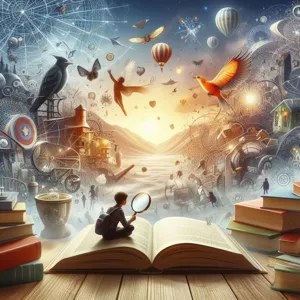
Setting goals for challenging your thinking is a vital step in unlocking new perspectives through literature. Just as athletes set training objectives to improve their performance, readers can establish specific, measurable goals that encourage them to step outside their comfort zones. Start by asking yourself what areas of your thinking you wish to expand. Are you looking to explore philosophical debates, dive into complex historical narratives, or engage with contemporary social issues?
Once you identify your interests, consider setting a goal to read a certain number of books from different genres or by authors with diverse backgrounds over a specified period. For instance, challenge yourself to read one book a month that focuses on a topic you know little about. This could mean picking up a biography of a revolutionary figure, delving into a science fiction novel that explores futuristic ethics, or engaging with a collection of essays on cultural criticism.
Additionally, think about incorporating a variety of perspectives into your reading list. Seek out books written by authors from different cultures, genders, or socioeconomic backgrounds. This not only broadens your understanding of the world but also helps you recognize and question your own biases and assumptions.
As you embark on this journey, keep a reading journal to reflect on how each book has influenced your thoughts and beliefs. Documenting your insights and challenges will help you track your progress and keep you motivated. By setting intentional goals for your reading, you create a roadmap for intellectual growth that will inspire you to continually seek out new ideas and viewpoints, ultimately transforming the way you see the world.
4. Exploring Different Genres: Beyond Your Comfort Zone
When it comes to expanding your literary palate, stepping outside your comfort zone can be one of the most enriching experiences you can embark on. Exploring different genres opens up a world of diverse perspectives, ideas, and storytelling techniques that can challenge your thinking and ignite your imagination. It’s easy to fall into the habit of sticking with what you know—whether it’s cozy mysteries, romance novels, or thrilling sci-fi adventures. However, the vast landscape of literature offers a treasure trove of genres just waiting to be unearthed.
Imagine delving into the thought-provoking realms of philosophy, where authors like Albert Camus and Simone de Beauvoir invite you to ponder the fundamental questions of existence. Or perhaps you’d find yourself captivated by the stark realities of memoirs that recount personal journeys through adversity—books that can offer insight into the lives and struggles of others, broadening your understanding of the human experience. Consider immersing yourself in the poetic rhythms of verse, where emotions are distilled into beautiful language, allowing you to see the world through a different lens.
Don’t shy away from genres that seem daunting, such as literary fiction or experimental narratives. These often challenge traditional storytelling structures, prompting you to think critically about both the content and form of what you’re reading. You might find yourself questioning societal norms through the lens of dystopian fiction or experiencing the raw power of truth in non-fiction works that dive deep into historical events or cultural critiques.
Joining book clubs or reading groups focused on diverse genres can also enhance this experience. Engaging in discussions with fellow readers not only allows you to share your insights but also exposes you to interpretations and thoughts you may not have considered. This communal exploration can lead to profound revelations, enriching your understanding further.
Ultimately, venturing beyond your comfort zone in the literary world can transform your reading experience from a simple pastime into a powerful tool for personal growth. So, take a deep breath, pick up that unfamiliar book, and allow yourself to be challenged, inspired, and forever changed by the stories that lie just beyond the horizon of your usual reads.
5. Seeking Recommendations from Varied Sources
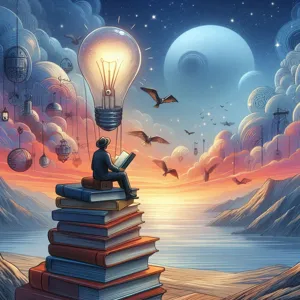
When it comes to discovering books that truly challenge your thinking and broaden your horizons, seeking recommendations from varied sources can be a transformative approach. The beauty of literature lies in its diversity; different perspectives can ignite new ideas, challenge your beliefs, and expand your understanding of the world. By casting a wide net for recommendations, you open yourself up to a wealth of knowledge that you might not encounter within your usual reading circles.
Start by tapping into the expertise of friends, family, and colleagues who share your passion for reading. They may introduce you to hidden gems that resonate deeply with their own experiences or interests, offering insights that you may have never considered. Consider joining online book clubs or forums where avid readers gather to discuss their latest finds. Platforms like Goodreads or specialized subreddits can be treasure troves of recommendations, where you can discover books that vary from the mainstream to the obscure, each with the potential to provoke thought.
Don’t overlook the value of recommendations from professionals in different fields. Engaging with authors, educators, or thought leaders on social media can provide you with a curated list of books that have influenced their thinking. Many institutions and organizations also publish reading lists that reflect a diverse array of topics and genres, ranging from philosophy to science fiction, ensuring you encounter literature that challenges conventional wisdom.
Lastly, don’t shy away from exploring book reviews and literary criticism. Websites, podcasts, and literary journals often feature reviews that dissect themes, styles, and ideas within books, giving you a deeper understanding of what to expect. This context can help you choose books that not only entertain but also provoke thought and discussion.
By seeking recommendations from a variety of sources, you enrich your reading experience and open the door to perspectives that may change the way you see the world. Embrace the journey of exploration; you never know which book may become a catalyst for your next great insight.
6. Utilizing Online Platforms and Book Communities
In today’s digital age, the vast expanse of online platforms and book communities can serve as a treasure trove for readers seeking to challenge their thinking and broaden their horizons. With just a few clicks, you can explore an array of resources that not only recommend thought-provoking titles but also connect you with like-minded individuals who share your passion for learning.
Websites like Goodreads allow you to track your reading habits, rate books, and discover recommendations tailored to your interests. By joining groups dedicated to specific genres or themes, you can engage in lively discussions that deepen your understanding of a book’s context and its impact on various spheres of thought. These communities often have reading challenges that encourage you to step outside your comfort zone and pick up genres you might never have considered before.
Social media platforms also play a crucial role in this exploration. Following book influencers, authors, and literary hashtags on Instagram, Twitter, or TikTok can introduce you to a plethora of unconventional reads. These platforms are ripe with creative content, from thought-provoking quotes to in-depth reviews, inspiring you to dive into books that may shift your perspective or challenge your beliefs.
Don’t forget about online forums like Reddit or specialized book blogs where avid readers congregate to share insights and recommendations. Participating in discussions or simply lurking can expose you to books and ideas that you may have never encountered otherwise.
In essence, utilizing these online platforms and book communities transforms your reading journey into a collaborative and interactive experience. As you engage with diverse perspectives and opinions, you’ll find that the books you choose can lead not only to personal growth but also to a deeper understanding of the world around you. So, dive into the digital realm, and let the collective wisdom of fellow readers guide you towards your next transformative read.
7. Reading Outside Your Cultural Context
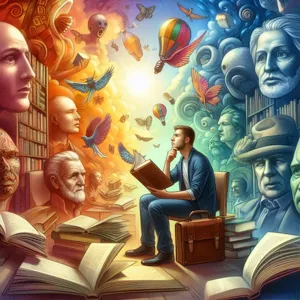
Reading outside your cultural context opens a treasure chest of perspectives that can profoundly challenge your thinking and broaden your horizons. It invites you to step beyond the familiar narratives and immerse yourself in the diverse experiences and worldviews of others. When you venture into literature from different cultures, you’re not just reading different stories; you’re engaging with the unique values, struggles, and joys that shape those societies.
Imagine diving into the rich tapestry of Nigerian literature, where authors like Chimamanda Ngozi Adichie and Wole Soyinka weave intricate tales that reflect the complexities of post-colonial life. Or consider the haunting beauty of Japanese literature, where Haruki Murakami transports you into surreal worlds filled with existential musings and profound insights into human relationships. Each cultural context offers a distinct lens through which to view the world, reshaping your understanding of universal themes like love, loss, and identity.
This journey isn’t just about enjoying different narratives; it’s also about developing empathy and a deeper understanding of global issues. By reading works that originate from cultures different from your own, you gain insights into social norms, historical contexts, and the challenges faced by people around the world. You may find yourself questioning preconceived notions and biases, leading to a more nuanced understanding of humanity.
To begin this enriching journey, consider exploring international bestseller lists, joining a book club focused on global literature, or following reading challenges that emphasize cultural diversity. Platforms like Goodreads or Instagram can be invaluable for discovering recommendations from fellow readers who share your interest in broadening horizons. Remember, each book is a portal to a different world, and the more you read outside your cultural context, the more expansive and informed your worldview will become. Embrace the unfamiliar—it might just be the catalyst for your next big personal revelation.
8. The Power of Non-Fiction: Expanding Knowledge
When it comes to expanding your knowledge and challenging your thinking, non-fiction books hold unparalleled power. Unlike fiction, which transports readers to imaginative realms, non-fiction immerses you in the rich tapestry of reality—offering insights into history, science, psychology, and a myriad of other disciplines. These books can serve as windows into other cultures, ideas, and experiences, broadening your perspectives in ways you never thought possible.
Consider the vast array of non-fiction genres available today. From gripping biographies that tell the stories of influential figures to thought-provoking essays that dissect contemporary issues, each non-fiction book has the potential to reshape your understanding of the world. For example, reading a well-researched historical account can illuminate the complexities of current events, while a compelling memoir may encourage empathy and spark a deeper appreciation for the struggles and triumphs of others.
Moreover, non-fiction books often challenge your preconceived notions and stimulate critical thinking. Authors like Malcolm Gladwell, Yuval Noah Harari, and Chimamanda Ngozi Adichie invite readers to engage with new ideas, question societal norms, and reconsider established beliefs. Their works can act as catalysts for personal growth, prompting you to reflect on your values and assumptions.
To make the most of your non-fiction reading journey, seek out recommendations from diverse sources—friends, online communities, or curated lists from literary platforms. Challenge yourself to explore topics outside your comfort zone; you might discover unexpected interests or insights that resonate deeply with you. By embracing non-fiction, you open yourself to a world of knowledge that not only informs but transforms your way of thinking, enriching your life and expanding your horizons in ways that fiction alone cannot.
9. Engaging with Classic Literature: Timeless Challenges
Engaging with classic literature is like embarking on a journey through time, where the voices of the past resonate with profound insights that remain relevant today. These works, crafted by some of the most brilliant minds in history, offer timeless challenges that compel readers to reflect on their own beliefs, values, and experiences. Delving into the pages of classics like Dostoevsky’s “Crime and Punishment” or Austen’s “Pride and Prejudice” invites you to grapple with moral dilemmas, societal norms, and the complexities of human relationships.
Classic literature not only provides a window into the culture and context of the time in which it was written but also serves as a mirror, reflecting contemporary issues in a new light. For instance, reading George Orwell’s “1984” prompts critical discussions about surveillance, freedom, and the nature of truth—topics that feel increasingly relevant in our digital age. Similarly, Shakespeare’s plays challenge readers to confront the intricacies of power, ambition, and human folly, reminding us that while society evolves, the human experience remains strikingly consistent.
Moreover, engaging with classic literature encourages a deeper level of critical thinking. The language may be archaic, and the themes may be complex, but it is precisely this challenge that sharpens your analytical skills and nurtures your ability to think deeply. As you navigate through the intricate plots and rich character developments, you’ll find yourself asking questions that provoke personal and societal introspection.
Incorporating classic works into your reading list not only broadens your literary palate but also enriches your understanding of the world. These stories have stood the test of time for a reason; they challenge us to confront uncomfortable truths, question long-held assumptions, and explore the depths of the human condition. So pick up a classic today, and let the timeless challenges within its pages unlock new perspectives that can transform your thinking for years to come.
10. How to Find Books by Underrepresented Authors
In a literary landscape often dominated by well-known voices, discovering books by underrepresented authors can be a transformative experience that expands your worldview and enriches your reading journey. These authors bring unique perspectives shaped by diverse cultures, experiences, and viewpoints, offering narratives that challenge conventional thinking and encourage empathy. Here are some effective strategies to help you find these hidden gems:
**1. Explore Diverse Book Lists and Recommendations:** Start by seeking out curated lists of books by underrepresented authors. Many literary websites, blogs, and organizations aim to promote diversity in literature. Websites like Book Riot and NPR often publish lists highlighting voices from various backgrounds, including LGBTQ+ authors, authors of color, and those with disabilities. These resources can provide a treasure trove of titles that may have flown under your radar.
**2. Utilize Social Media and Online Communities:** Platforms like Twitter, Instagram, and Goodreads are incredible tools for discovering diverse literature. Follow hashtags such as #OwnVoices, #DiverseBooks, or #ReadWomen to connect with recommendations from readers and authors alike. Joining online book clubs or discussion groups focused on diversity can further enhance your discovery process, as community members share their favorite reads and insights.
**3. Visit Local Bookstores and Libraries:** Your local bookstore or library can be an excellent resource for finding books by underrepresented authors. Many independent bookstores take pride in curating selections that reflect the diversity of their communities. Don’t hesitate to ask staff for recommendations—they’re often passionate readers who can direct you to lesser-known authors. Additionally, keep an eye out for displays or sections dedicated to diverse voices.
**4. Follow Literary Awards and Prizes:** Keep an eye on literary awards that specifically celebrate underrepresented voices, such as the Stonewall Book Awards or the Lambda Literary Awards. These awards often highlight outstanding works that might otherwise go unnoticed, providing an excellent starting point for your reading list.
**5. Engage with Author Events and Festivals:** Look for author readings, book signings, and literary festivals that feature panels on diversity in literature. Engaging with authors directly can deepen your understanding of their work and give you insight into their unique perspectives. These events often showcase emerging voices and provide opportunities to discover new titles.
By actively seeking out books by underrepresented authors, you not only enrich your reading experience but also contribute to a more inclusive literary community. Each new perspective you encounter has the potential to unlock new ways of thinking, fostering understanding and empathy in an increasingly complex world. So grab a book, challenge your assumptions, and embark on a journey through the diverse landscapes of human experience.
11. Joining Book Clubs for Broader Discussions
Joining book clubs is a powerful way to discover new titles that challenge your thinking and broaden your horizons. These gatherings are more than just a chance to discuss the latest bestseller; they serve as a vibrant community where diverse perspectives intersect, creating a rich tapestry of ideas and insights. By engaging with fellow readers, you expose yourself to books you might never have picked up on your own, from thought-provoking non-fiction to challenging literary classics.
In a book club, the discussions often delve deeper than the plot or characters. Members share their interpretations and personal connections to the material, leading to enlightening conversations that can shift your perspective and inspire new thoughts. For instance, a book about social justice might spark a discussion on current events, prompting you to consider different viewpoints and encouraging empathy for experiences unlike your own.
Moreover, book clubs often have a theme or focus, such as works by diverse authors, international literature, or specific genres. This thematic approach can introduce you to voices and narratives that you may not encounter in mainstream literature, enriching your reading experience.
Whether you join a local group that meets in person or an online community that connects through social media platforms, being part of a book club fosters accountability and motivation. You’ll find yourself reading more frequently and exploring genres outside your comfort zone, all while building friendships with others who share your passion for literature. So, take the plunge—join a book club, and unlock the potential for transformative discussions that will not only enhance your reading life but also stretch your imagination and understanding of the world.
12. Embracing Audiobooks and Podcasts as Alternative Formats
In the digital age, the ways we consume literature and ideas have evolved, offering exciting alternatives to traditional reading. Embracing audiobooks and podcasts can be a transformative experience, opening doors to a wealth of knowledge and diverse perspectives that might otherwise go unnoticed. These formats allow you to engage with content while multitasking—whether you’re commuting, exercising, or simply enjoying a quiet moment at home.
Audiobooks, for instance, bring stories to life through the art of narration. A skilled narrator can infuse characters with unique voices and emotions, adding layers of depth to the text. This immersive experience not only makes complex themes more accessible but can also illuminate aspects of the narrative that you may not have grasped through the printed word alone. Imagine listening to a historical biography narrated by a passionate voice that transports you to another era, or a thought-provoking philosophy book that challenges your worldview, all while you’re on a brisk walk or cooking dinner.
Podcasts, on the other hand, have emerged as a dynamic medium for exploring ideas and engaging in discourse. With countless shows covering an array of topics—from science and psychology to culture and politics—podcasts offer insights from experts and enthusiasts alike. They often feature interviews, discussions, and storytelling that provoke thought and inspire curiosity. By tuning into conversations that challenge your beliefs or introduce you to new concepts, you can expand your understanding of the world in a way that feels both personal and interactive.
Incorporating audiobooks and podcasts into your routine not only diversifies your intake of information but also encourages a habit of lifelong learning. You might find yourself drawn to genres or subjects you initially overlooked, sparking new interests and fueling your desire for growth. So, plug in, press play, and let the voices of authors and thinkers guide you on a journey that promises to broaden your horizons and challenge your thinking in the most delightful ways.
13. Reflecting on What You Read: Keeping a Reading Journal
Reflecting on what you read is a powerful way to deepen your understanding and retain the insights gleaned from each book. One of the most effective methods for this reflection is maintaining a reading journal. This simple yet impactful tool serves as a personal space where you can document your thoughts, feelings, and reactions to the material you engage with.
A reading journal can take many forms—whether you prefer a traditional notebook, a digital document, or even a dedicated app, the key is consistency. Start by jotting down quotes that resonate with you, summarizing chapters in your own words, or scribbling down questions that arise as you read. By actively engaging with the text in this way, you transform passive reading into an interactive experience, allowing you to explore the themes and arguments that challenge your thinking.
Additionally, reflecting on your reading journey can reveal patterns in your interests and intellectual growth. You might discover that certain genres or authors consistently spark new ideas, or that specific topics evoke strong emotional responses. This awareness can guide your future reading choices and help you seek out books that will further broaden your horizons.
As you look back through your journal entries, you’ll likely find a treasure trove of insights and revelations that you may have otherwise forgotten. This practice not only reinforces your learning but also encourages you to revisit and engage with ideas long after you’ve closed the book. So, make it a habit to pause and reflect—your reading journal could become the key to unlocking new perspectives and enriching your literary adventures.
14. The Role of Critical Thinking in Reading
Critical thinking is the bedrock of any enriching reading experience, serving as a lens through which we can examine and interpret the world around us. When we engage with a text, it is not merely about absorbing information; it’s about dissecting ideas, questioning assumptions, and evaluating arguments. This active approach transforms reading from a passive activity into a dynamic dialogue between the reader and the author.
As you delve into a book, ask yourself: What is the author’s main argument? Are there biases at play? How does this text relate to other information I’ve encountered? By employing critical thinking, you sharpen your ability to analyze complex themes and draw meaningful connections, making the reading experience not just informative but transformative.
Moreover, critical thinking encourages you to explore perspectives that are different from your own. In a world filled with divergent views and interpretations, books that challenge your thinking often present unfamiliar arguments or ideologies. By grappling with these ideas, you cultivate an open-mindedness that expands your worldview. This doesn’t mean you have to agree with every perspective, but rather that you take the time to understand and evaluate them thoughtfully.
Incorporating critical thinking into your reading habits can lead to profound personal growth. It empowers you to question societal norms, challenge conventional wisdom, and develop your own informed opinions. So, the next time you pick up a book, remember that it’s not just the story or information that matters, but also your engagement with it. Embrace the role of a critical thinker, and allow each page to invite you into a deeper understanding of the world around you. Whether it’s fiction, non-fiction, or poetry, every genre holds the potential to reshape your thinking and broaden your horizons.
15. Conclusion: Making Continuous Exploration a Habit
In the ever-evolving landscape of knowledge and ideas, making continuous exploration a habit is not just beneficial—it’s essential. The journey of discovering books that challenge your thinking and broaden your horizons should be seen as an ongoing adventure rather than a destination. As we’ve explored throughout this post, the act of seeking out diverse perspectives can reshape your understanding of the world and enrich your life in countless ways.
To weave exploration into the fabric of your daily routine, consider setting aside dedicated time each week to read, research, and reflect. Curate a list of books that intrigue you, mixing genres and themes to ensure a well-rounded experience. Join a book club or online community to engage in lively discussions and share insights with fellow seekers. This not only holds you accountable but also exposes you to titles you may not have considered on your own.
Embrace the digital age by utilizing apps and platforms that recommend books based on your interests, or challenge yourself to step outside your comfort zone by picking up titles from unfamiliar authors or cultures. Remember, every book is an opportunity to step into another person’s shoes, to see the world through a different lens, and to question your own beliefs and assumptions.
As you cultivate the habit of continuous exploration, you’ll find that the benefits extend beyond just acquiring knowledge; they foster empathy, creativity, and a deeper connection to the complexities of human experience. So, embark on this journey with open arms and an open mind—your next great read is waiting to transform the way you think and see the world.
As we conclude our exploration of unlocking new perspectives through literature, we hope you feel inspired and equipped to seek out books that not only challenge your thinking but also expand your worldview. The journey of discovery through reading is a transformative one, offering insights that can reshape your beliefs and spark meaningful conversations. Remember, the next time you pick up a book, you’re not just turning pages; you’re opening doors to new ideas and experiences. Embrace the adventure of stepping outside your comfort zone and let the power of diverse narratives guide you to a richer understanding of the world around you. Happy reading, and may your literary journey be filled with enlightening surprises!

